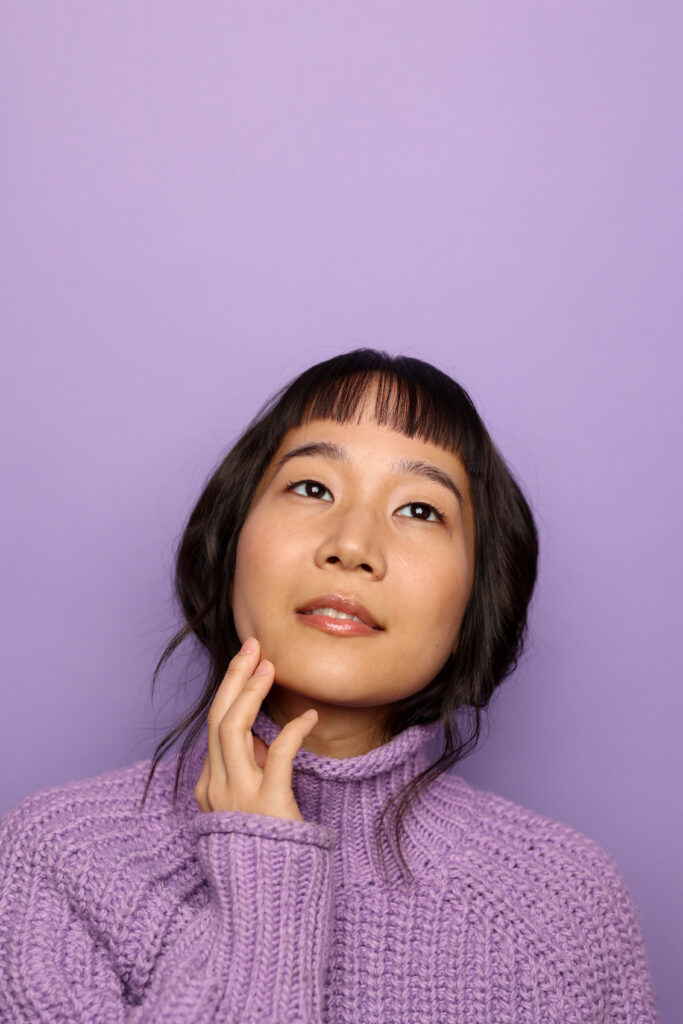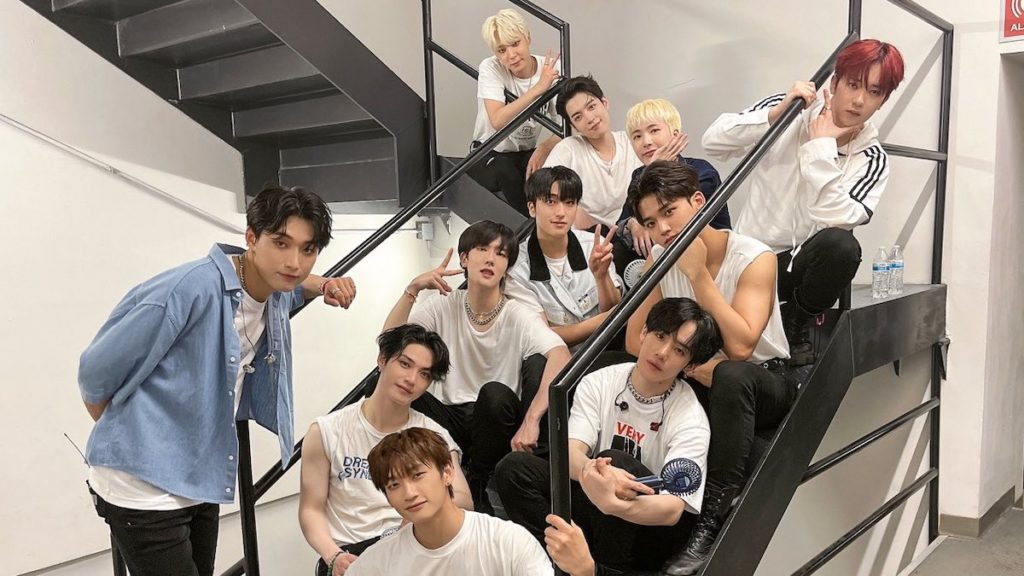Meet Naomi Okada: The Juilliard Alumna You’ll Want To Keep On Your Radar

Approximately 5,180 miles. That’s how big a leap of faith Naomi Okada took when she first began her journey of becoming an actress in the United States. From learning and growing in Tokyo, Japan, to becoming accustomed to the streets of Brooklyn, New York, Okada’s life voyage has been largely marked by adaptability and introspection.
Through a much smaller — but equally impactful — act of assurance, Okada reached out to EnVi in hopes of sharing her story with an audience that appreciates diverse narratives. Speaking with EnVi over Zoom, Okada illustrated her dissentient upbringing, her exploration of acting across mediums, and her plans for the future.
Living Outside The Bubble
Despite hailing from a homogeneous society like Japan, Okada has lived a life that empowered her to experience the oh-so-vast world through a nuanced lens. “I was born and raised in Tokyo, Japan. That was my entire cultural upbringing, Japanese parents, Japanese family,” Okada said to EnVi. “But my mom was the one who had pioneered this Western kind of [cultural experience] by putting all of her kids into international schooling. So the proximity that I had to Japanese culture and Western culture was very much in sync with each other since I was very little.”
Shedding light on her mother’s proactive decision, Okada explained that she was not quite pleased with the painstaking academic standard implemented during her childhood. Not wanting her children to be just another cog in the system, Mrs. Okada arranged for an embracive approach to life. “My mom primarily put us into these educational systems because she had felt the Japanese education system was a little bit too rigid for her. And this was also a generational thing, but when she was a kid, she had felt like the Japanese system was a little bit too much about exams and rote memory and like getting the grades,” Okada said. “She was just a lot more of a creative person. And she wished for herself that she could be in an educational system that was a little bit more creative and just a little bit less rigid.”

As she continued to reflect on her upbringing, Okada extended a message of sincere appreciation towards her parents, who provided her with a steady life foundation. “To this day, I am so thankful and so grateful to my parents for putting me through a culturally different educational system, because it informs exactly who I am today, and it informs my pathway to becoming an actor as well,” she explained. “If I had a completely different education and upbringing generally, I don’t think I would’ve come to acting.”
During her youth, Okada took part in a multitude of artistic activities from ballet and gymnastics to playing the harp and the flute, but the one creative outlet that resonated with her the most was singing. “I was always doing something with my body, and my parents were very big on focusing their kids to develop in that way. Singing was one of my first loves in terms of the performing arts, and acting came in later in my life,” she stated. It wasn’t until she entered high school that Okada began acting — and even then, she did not anticipate that it would be her future career path: “My American high school in Japan would do a musical every year, and I remember as a freshman, I was like, ‘I only sing. I don’t act. This musical thing is not really for me,’” she explained.

Even though she lacked faith in the idea at the time, several people saw her potential and lightly encouraged Okada to give it a try. “[During] my second year, I remember my mom was like, ‘I think you should do it, that would be fun for you.’ [And in another instance] I remember there was a senior who had come up to me during class, and she was like, ‘I think you should audition for the musical,’ And I was like, okay. And then I did,” she revealed. “That was the first experience I had acting, and it was Legally Blonde the musical, which was such a fun experience. To this day, I think it is a genius musical.” As Okada progressed further through high school, she was still fixated on the idea of pursuing singing as a career, but it wasn’t until she moved to the United States for college that everything began to shift.
From Tokyo to Connecticut
In 2016, Okada officially committed to Wesleyan University, where she would eventually receive a BA in Theatre and Education Studies. However, the decision to choose a college in “the middle of nowhere Connecticut” was not as simple as you’d imagine. At the time, an 18-year-old Naomi had a lot of things to consider. “From what I remember when I was applying for colleges in high school, I knew I wanted to study artistic things, but I didn’t know if that was gonna be music or theater or something completely different,” Okada explained. “I knew I was interested in acting and in singing and all of that, but I was not at all in this pipeline of being ready to go to a conservatory-style place. I feel like at the age of 17 or 18, if you knew you wanted to do [something] like an acting conservatory, there’s a process in which [you] get prepared for those college auditions. And I was not on that track at all.”
Even though Okada was doubtful, she still took the time to apply for several BFA programs at institutions like NYU Tish, Pace, and UCLA: “I remember shooting my shot at it, but I think at the end of the day all things pointed to a small liberal arts school at Wesleyan.”
In retrospect, her choice attendance at Wesleyan seemed like fate, as she revealed both of her siblings had previously gone there: “I have two older siblings, they actually both went to Wesleyan University, so I was informed on what the campus was like and what kind of stuff that people do there and what kinds of students go there,” she said.
Even though she was lightly familiar with what to expect from Wesleyan, it was an exchange Okada had with her brother that ultimately opened her eyes to the possibilities that lay ahead. “I remember the conversation. He was like, ‘Do you want to have a very regimented [and] structured [schedule] where every student in that class gets the same training. Or do you want to be on a campus with cool people who do cool stuff, and do you wanna do cool things?’ And at that point, when I was 17, 18, I was like, ‘I think I want the latter. I think I wanna do cool stuff with cool people,’” she explained with a laugh.
As a means to help his sister further understand the type of talent Wesleyan cultivates, Okada’s brother called attention to one of the university’s famous alumni Lin-Manuel Miranda, who crafted the earliest draft for the 2008 Broadway musical In The Heights during his sophomore year at Wesleyan. “[My brother] was like, that’s the kind of shit that can happen at Wesleyan, but nobody trains you to do that. That was all him.”

Since she first visited the campus in 2011, Wesleyan had undergone many changes — but that did not mean her experience was any less than that of her siblings. As she gushed about the campus happenings, Okada noted the palpable sense of fervor for the arts that was present at all times. “Wesleyan was creatively self-generative. You are surrounded by people who are just really passionate, and the campus has a great ground for inspiring that passion and almost sponsoring that passion too,” she explained. “There’s a lot of funding that will go into student-generated projects, and that was where I met so many different kinds of collaborators — people who are now producers in [varying industries], or filmmakers, directors, writers, and other actors.”
With the program being unconventional, Naomi revealed that there was a level of unpredictability when it came to thinking about what path everyone would ultimately end up on, but nonetheless, she made the most of her time in the ardent environment. “[The curriculum was] more uncertain in terms of following this ladder that could potentially get you into specific rooms and get you connected to different casting directors and all of that,” she said. “But that [experience] really lit something up in me. And I think it was exactly what I needed during those ages of 18 to 22. Because eventually, I think that creative environment ultimately led me to also want that rigid, very rigorous, conservatory style training. And I think I was a lot more prepared for that later in my life than at 18.”
Next Destination — New York
As Okada entered the latter half of her time at Wesleyan, she became more confident in her abilities and desired to sharpen her skills through more formal training. In 2018, she spent a large portion of the year abroad, completing a theater apprenticeship in Greece with One Year Lease Theater Company and studying at the Moscow Art Theater School in Russia. Both experiences, although difficult, further solidified her evolving acting foundation: “I just loved the rigor of it, loved the intensity of it. And then after [those] programs, I was like, ‘I think I wanna do more of that.’ And I auditioned for almost every MFA program that existed in the United States. And then, by stroke of luck, I got into Juilliard and continued my training there.”
During her time at Juilliard, Okada built an extensive resume, participating in theatre productions such as Water by the Spoonful and screen projects like the queer web series Q-Train. Her favorite project to date was revealed to be Shakespeare’s Measure for Measure, where she played the lead role of Isabella, a novice nun who must choose between faith and family after her brother is sentenced to death as a result of fornication.
The play, which was first performed in 1604, presented quite the challenge for Okada — but that’s exactly what made the experience impactful. “It was one of those productions that felt so intimidating to do, especially because I’m generally a little bit intimidated by Shakespearean text and [the themes of] Measure for Measure are very complex,” she explained. “The language is not intuitive. Even hearing it after analyzing the text so much, it still boggles my mind. I was like, ‘I don’t know how, and I don’t know where to even begin to understand what she’s saying.’ So it was such a difficult yet fulfilling process to dig deep into that. And it was just the biggest acting challenge that I’ve ever encountered.”

If the chance ever arose for her to take on the role again, Okada mentioned that she would be more than happy to do so: “With such a short rehearsal process, I think it was maybe four or five weeks, I don’t think I got to the core of it. We never get to a place [where] we figure out a play or character…but I think there was so much more to excavate,” she said. “It was my favorite production because it challenged me a lot. [At the time] I never felt that sense of pride [but] at the end I was like I wanna do that again, and I want to do it better.”
Interconnected Life Experiences
Outside of Wesleyan’s free-spirited framework and Juilliard’s meticulous training, Naomi noted how her experience integrating into American society also helped her develop as an actor. When she initially came to the United States to attend Wesleyan University, Naomi was under the impression that she was well equipped to deal with Western ideals, as she had grown up in a cross-cultural environment: “I [didn’t] think I [would] feel a culture shock at all,” she explained. “I spoke [English] fluently, I was exposed to Western media and culture, and the microcosm of my [high school] campus [in Japan] was super American. So I went into it being like ‘It’s gonna be fine.’”
Contrary to her optimistic beliefs at the time, the move proved to be a bit more disorienting than she could have imagined. “When I got [here], I felt like I was a fish out of water,” she said. “Like the humor. That was the main thing, that the humor wasn’t the same. And [another thing that] was different was also this small talk culture. I wasn’t used to it at all.”

Although the experience was, as she stated, “extremely jarring” at the time, the present Naomi now looks back at the situation through a more cultivated lens. “I’ve gotten pretty used to this sort of code switching, and sometimes I feel a lot more American than I do Japanese, and in other contexts I feel super Japanese and not at all American,” she explained. “And I think there was a point in time when I was making that cultural transition where I felt so desperate to feel like I needed to belong in one world. But I think as I got older and gained more life experience, I felt there was a huge privilege in being able to understand both.”
Expanding further on the moment of introspection, Naomi once again expressed gratitude to her parents, who crafted the cornerstones she needed to succeed on her life path: “It goes back to the way that my parents have raised me,” she explained. “[They taught me] to be very culturally open and culturally liberal and just be a sponge to so many different kinds of people. And I think [my upbringing] has given me a lot of ways into characters that maybe ten years ago I could have never stepped into because I just couldn’t even fathom how I would do it,” she continued. “Because of the cultural diversity that exists in me, I feel like my world has expanded, and also the way I look into characters and engage with acting as a craft in general has expanded.”
An Ode To Those Who Inspire
Following the widely reflective interview, Okada took the final moments to speak about the types of actors that inspire her. Not being able to pick just one, she listed four multi-hyphenate talents, including Meryl Streep, Anne Hathaway, Viola Davis, and Greta Gerwig. “I think I am really drawn to actors who come from such a solid place of training,” she explained. “And it’s not that I believe that actors require training to be successful. I honestly don’t think actors need training at all. But I feel like I am not only drawn to their work, but to the way they talk about acting and how they approach the craft. Because I do think it’s a lifestyle, and I think the way a person thinks about acting is so informative of the way they show up to work.”
As she mused on the topic, Okada brought attention to words from Meryl Streep that have impacted the way she perceives and approaches the acting as an artform: “One thing that keeps resonating in the recent months has been this interview of Meryl Streep, who was saying that actors, the really good actors [have] a deep understanding that life is so fleeting and nothing is permanent, so they stay in the present. And because actors, even successful actors, live this life [where] you don’t know when your next job is gonna come to you. You live your life mostly unemployed. So, because of that fact, you have to stay present in the moment,” she explained. “The good actors have a deep understanding of that. Whereas other people might not have to have that kind of thinking, and I find that to be so true in [Meryl Streep’s] acting as well — she’s very present. You can tell when an actor is over here in their mind and thinking about something else, or the way that they’re being perceived. But I think when I watch her work, that way of thinking [about] life translates into [her] acting.”
The Next Multi-Hyphenate Star
Equipped with her various life experiences and knowledge from those who inspire her, Okada moves forward with her head held high. “My dream right now is to be able to have a seamless career in theater and on screen. [That] is also a huge reason why I love Meryl Streep, because she has such a heavy theater background and is iconic in onscreen stuff. So I want to be someone who can seamlessly do that transition and to be able to do both things really well,” she shared. “I also still love singing. I’m not a musical theater person as much anymore, but I would love for music to still be in my life and to have the opportunity to be able to incorporate that in acting as well. I also have big aspirations for creating my own work as well — that has been like a more recent realization for me. But [in the future] I would love to see work that I’ve written or produced in the world.”

Don’t miss out on what Naomi Okada has coming up next. Be sure to keep up with her journey on Instagram!
Interested in discovering more diverse narratives? Check out our interview with 2x Academy Award-nominated director Smriti Mundhra here!



